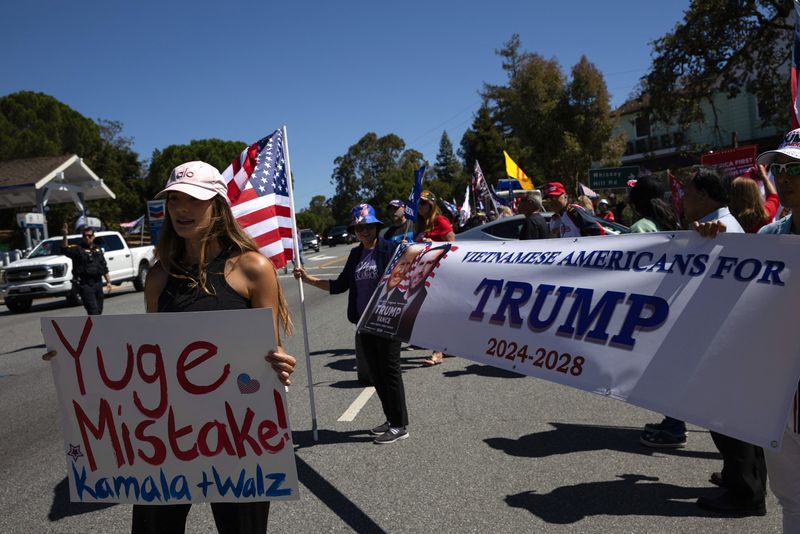WASHINGTON (Reuters) -The U.S. presidential contest between Democrat Kamala Harris and Republican Donald Trump features an array of legal battles over how the votes are cast and counted that are likely to last beyond Election Day on Nov. 5.
Here are some of the most significant voting-related disputes that are playing out in the seven competitive swing states that are likely to determine the outcome of the election. Together they control 94 of the 270 Electoral College votes a candidate needs to win:
ARIZONA, 11 Electoral College votes
2020 winner: Democrat Joe Biden
Democratic Governor Katie Hobbs, Republican-controlled state legislature
State laws that prevent people from being registered to vote in different places remain in effect under a federal appeals court ruling. The laws allow counties to cancel registrations of voters who have moved out of state and makes it a crime to help an out-of-state resident vote in Arizona. Voting rights groups had said they unfairly targeted voter registration efforts.
A conservative legal group has also sued to force election officials to verify that registered voters are U.S. citizens.
Separately, the state's Supreme Court ruled in September that 97,000 registered voters should not be disqualified because the state does not have proof they are U.S. citizens. The voters in question had been registered before 2004, when the state passed a law requiring proof of citizenship to vote in state and local elections.
The state Supreme Court also dismissed a lawsuit brought by a conservative group that sought to roll back expanded voter registration and ballot drop options.
GEORGIA, 16 Electoral College votes
2020 winner: Biden
Republican Governor Brian Kemp, Republican legislature
State courts have blocked dramatic changes sought by a Republican-controlled election board.
The board had passed rules that would have required poll workers to hand count ballots and given county officials more power to investigate vote results. Voting rights groups say that would have slowed down the vote counting process and could have enabled Trump allies to block certification if he loses. State courts have prevented the rules from taking effect before the election.
A state judge also ruled county officials are required to certify election results even if they have concerns about the process. Republicans are appealing.
MICHIGAN, 15 Electoral College votes
2020 winner: Biden
Democratic Governor Gretchen Whitmer, Democratic legislature
Courts have rejected Republican lawsuits that sought to loosen rules that govern partisan election challengers, as well as a Republican lawsuit that sought to tighten eligibility for overseas voters. A Republican effort to force the state to more aggressively remove outdated or ineligible voters also failed in court.
The Republican National Committee settled a lawsuit with the state regarding how absentee ballots are handled, though a separate lawsuit on the issue has yet to be resolved.
The RNC separately reached an agreement with the city of Detroit to recruit more poll workers.
The RNC has also sued to block Michigan from allowing veterans and small business agencies to register voters.
NEVADA, 6 Electoral College votes
2020 winner: Biden
Republican Governor Joe Lombardo, Democratic legislature
A Republican effort to force the state to more aggressively remove outdated or ineligible voters failed in court.
Another Republican lawsuit, which aims to force the state to verify that registered voters are U.S. citizens, is ongoing.
Trump and his allies have claimed that the election could be skewed by widespread voting by noncitizens, though they have provided little evidence in court filings.
NORTH CAROLINA, 16 Electoral College votes
2020 winner: Trump
Democratic Governor Roy Cooper, Republican legislature
A state appeals court ruled on Sept. 27 that digital identification cards issued by the University of North Carolina would not be accepted at polling places, following a Republican lawsuit. That could make it more difficult for students to vote.
Republicans have also sued to force state officials to act more aggressively to remove suspected noncitizens from voting rolls. The party has also sued to prohibit some state residents who live overseas from voting, and has also sued to invalidate absentee ballots that have not been properly sealed.
PENNSYLVANIA, 19 Electoral College votes
2020 winner: Biden
Democratic Governor Josh Shapiro, divided legislature
The state Supreme Court ruled that mail ballots must be rejected if they do not have the correct date written on their outer envelope. Voting rights groups had argued that the requirement serves no purpose and has invalidated thousands of legitimate ballots.
Separately, Pennsylvania's highest court rejected a Republican lawsuit that sought to prevent local officials from allowing voters to cast provisional ballots in person if their mail-in ballots are rejected due to flaws like missing secrecy envelopes.
Election officials may again need several days to tally mail ballots, as state law does not allow them to begin preprocessing them until Election Day. That risks repeating the chaos of the 2020 election, when Trump and his allies used the delay to sow doubts about the validity of the outcome.
WISCONSIN, 10 Electoral College votes
2020 winner: Biden
Democratic Governor Tony Evers, Republican legislature
Voters will be able to cast their absentee ballots in drop boxes after the state Supreme Court overturned a statewide ban.

The court is also considering a case brought by a conservative group that would bar the use of mobile voting sites on the grounds that they give Democrats an unfair advantage. The court is also considering whether election workers can allow voters to fix errors on absentee ballots.
As in Pennsylvania, Wisconsin also may not be able to quickly declare a winner as it does not allow absentee ballots to be preprocessed before Election Day.